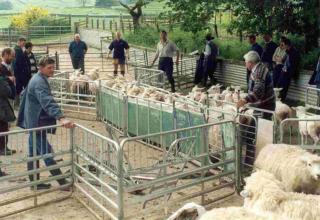Enhancing Food Chain Sustainability Through Improving Business Relationships And Communication
Published on 21 May 2009 in Sustainability and Communities

Introduction
Agricultural producers are part of supply chains that take products from farms to final consumers. However, whilst the flow of food produce normally moves in one direction, i.e., towards consumers, the information flow moves in both directions. Thus, suppliers provide information about product provenance, specification, prices, availability and food safety issues, whilst information also flows in the opposite direction on customer requirements and consumer preferences.
Building effective business relationships within supply chains may involve:
• moving from occasional transactions with different customers on spot markets, to establishing frequent repeat transactions with only one or a few customers,
• or developing from informal transactions with customers to more formal or contractual ways of operation.
Together with communicating effectively with other supply chain participants, the quality and stability of these relationships is a key determinant of chain performance and sustainable competitive advantage. This is because, from a business perspective, effective relationships and good communication may:
• reduce uncertainty (e.g., through increased information flow about supply and demand conditions);
• provide better access to crucial resources (e.g., specialised skills or knowledge);
• result in higher business productivity (e.g., through reduced distribution costs or improved production and marketing decisions);
• help producers to respond to changes in consumer preferences (e.g., increase in health concerns regarding nutrition).
From a consumer perspective, good food supply chain relationships and communication may lead to greater satisfaction with the food that they are able to purchase and consume.
The development of sustainable business relationships and intensifying communication along the chain were explored by SAC in the context of the EU project ‘Key factors influencing economic relationships and communication in European food chains’ (FOODCOMM).
Key Points
Sustainable business relationships and the role of communication were studied in the context of two UK supply chains: the cattle-to-beef and the barley-to-beer/whisky chains. Both chains are characterised by marked quality requirements, strong international competition, and in recent years have witnessed strong financial pressures. Moreover, both have successfully addressed food safety issues and implemented rigorous quality assurance schemes.
The beef chain is characterised by a lack of trust amongst many farmers on pricing issues, and this is matched by a strong culture of business independence. The market, therefore, is dominated by spot and repeated market transactions with regular suppliers and buyers.
Within the malting barley to beer/whisky chain, the requirement for predictable supplies in terms of quantity, quality and price, encourages contractual arrangements and repeated transactions with reliable suppliers and buyers. However, both tight margins and market instability can serve to weaken chain relationships.
The evidence generated in the project suggests that good supply chain relationships are assisted by:
• good supply chain communication embracing the usefulness, timeliness and frequency of information flow
• an equitable sharing of commercial benefits arising from supply chain improvements
• and the personal bonds and regard that exists between supply chain partners.
Moreover, good relationships and communication have a positive effect on profitability, but these effects are slightly more apparent in the barley to beer/whisky chain than the beef chain. Furthermore, there is considerable scope for relationship and communication improvement in both chains.
Research Undertaken
Two projects have provided research findings on the issues of economic relationships and communication in the supply chain: ‘The implications of the CAP reform’ (IMCAPT) at the Scottish level and (FOODCOMM) at the EU level.
In the case of FOODCOMM, the research involved 6 countries: Finland, Germany, Ireland, Poland, Spain, and the UK, and 6 processed products: fresh pork, cured ham, sausages, fresh beef, beer and bread. In the case of the UK, two supply chains were studied; cattle-to-beef and barley-to-beer/whisky.
Policy Implications
The UK research identified a number of success factors for developing sustainable agri-food supply chain relationships and communication, and they need to be recognised in policy development related to agri-food supply chain improvement.
• Businesses need to have common or strongly compatible objectives/interests. Thus, where a chain is formed to serve a clear market opportunity, such as a branded product for a niche market, then a common purpose clearly exists.
• The businesses need to be important to each other as valuable suppliers or customers. In building a relationship, efforts should be made to understand each other's business and what is important to them.
• Commercial benefits - such as value creation, cost savings, enhanced business flexibility, or improved risk management - are evident in sustainable relationships, whether they are created by improved practices or investment. In addition, these commercial benefits need to be shared equitably amongst those responsible for their creation, if the relationships are to be enhanced.
• Common investments can enhance relationships, but all the involved parties need to profit from them.
• A high level of professional / technical competence amongst the participants serves to reinforce the levels of trust and personal bonds amongst those involved.
• Good quality communication is required, both in relation to technical and logistical issues, as well as creating awareness of market conditions. Communication serves both chain efficiency and effectiveness. Moreover, good quality communication builds chain transparency, confidence and trust, and helps to resolve conflict in the chain.
Author
Cesar Revoredo-Giha & Philip Leat cesar.revoredo@sac.ac.uk, philip.leat@sac.ac.uk
Topics
Sustainability and Communities







